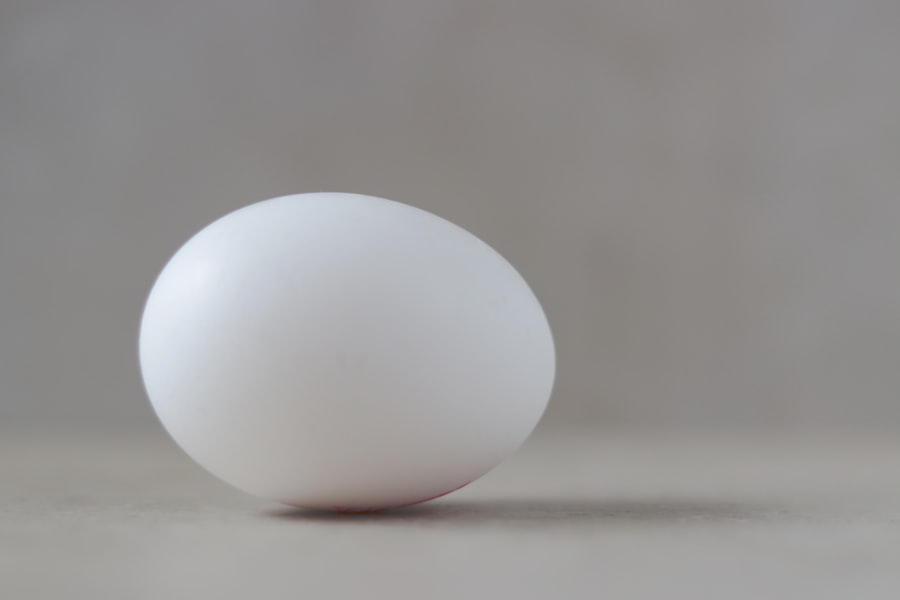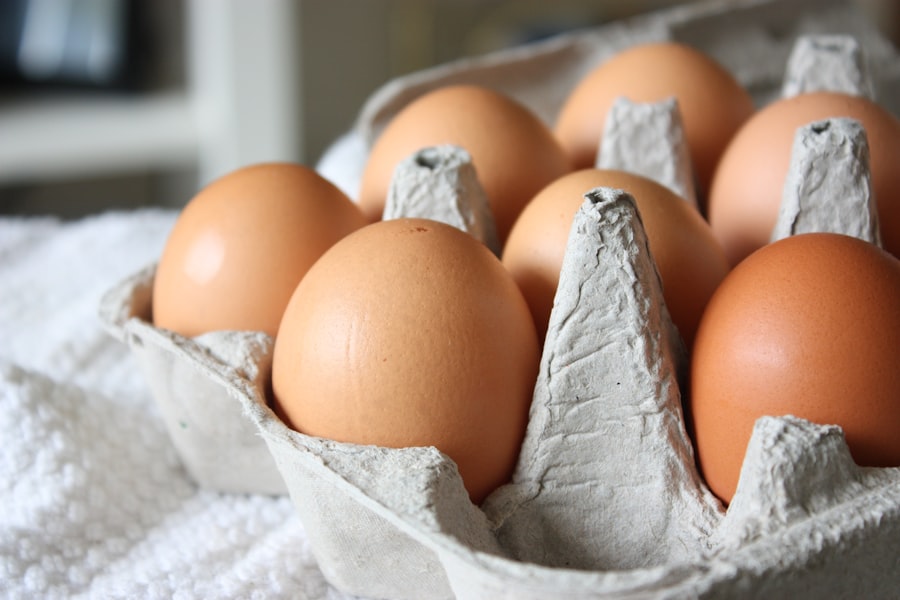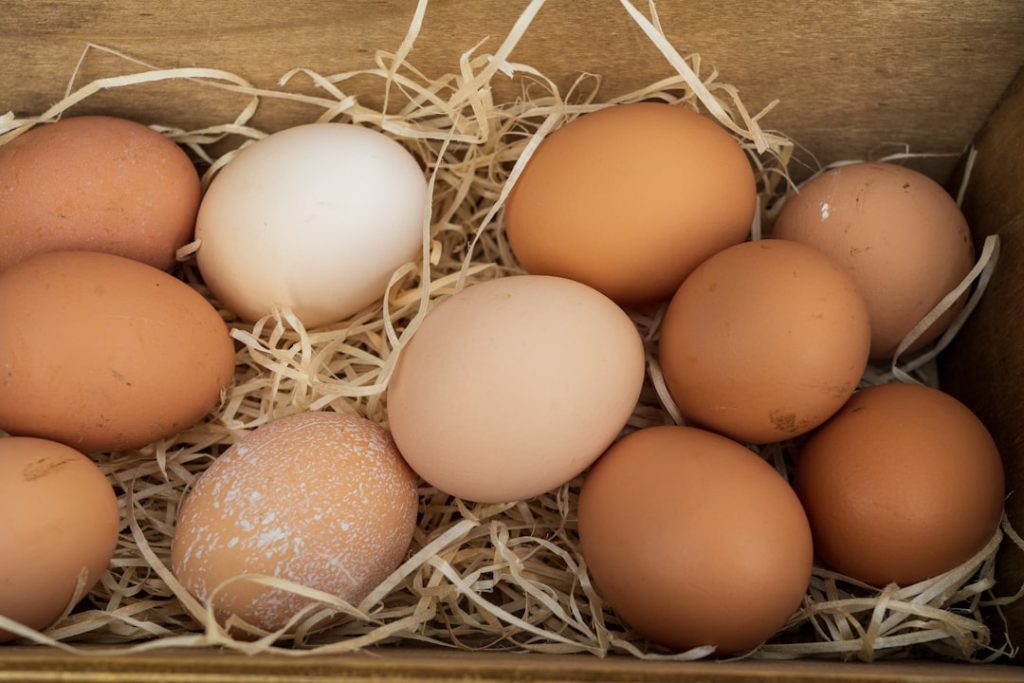Eggs are a common household ingredient used in numerous recipes. Proper storage is crucial for maximizing their shelf life and ensuring food safety. Whether store-bought or collected from backyard hens, understanding the factors affecting egg longevity and optimal storage methods is essential.
Following proper storage guidelines can extend egg freshness and reduce spoilage risks. Egg storage plays a vital role in maintaining food safety and quality. Incorrect storage can promote bacterial growth, including Salmonella, potentially causing foodborne illnesses.
Improperly stored eggs may also lose freshness and flavor more rapidly. Implementing best practices for egg storage helps optimize this versatile ingredient’s use and minimize food waste. This article will examine factors influencing egg shelf life, appropriate storage techniques, indicators of spoilage, and long-term storage options to maximize the longevity of fresh eggs.
Table of Contents
Key Takeaways
- Proper egg storage is essential for maximizing shelf life and maintaining egg quality.
- Factors such as temperature, humidity, and air circulation can affect the shelf life of eggs.
- Store eggs in their original carton in the coldest part of the refrigerator to maintain freshness.
- Signs of spoiled eggs include a foul odor, changes in texture, and discoloration of the yolk or white.
- Using up eggs before they spoil can be achieved through various cooking and baking methods.
Factors Affecting Egg Shelf Life
Temperature Control
Temperature is a critical factor in egg storage. Eggs should be kept at a consistent temperature below 40°F (4°C) to slow down the growth of bacteria and maintain their freshness. Fluctuations in temperature can cause condensation to form on the eggshell, which can create an environment for bacteria to thrive.
Humidity and Moisture
Humidity is another important factor in egg storage. Eggs should be stored in a cool, dry place to prevent moisture from accumulating on the shell, which can promote bacterial growth and spoilage.
Air Exposure and Handling
Exposure to air can cause eggs to deteriorate more quickly. The protective coating on the eggshell, known as the cuticle, helps seal the pores and protect the egg from contamination. However, washing eggs or storing them in a humid environment can compromise this protective layer. It’s important to handle eggs with care and store them in a way that minimizes exposure to air to preserve their quality.
Proper Egg Storage Techniques

Proper egg storage techniques are essential for maintaining the freshness and safety of eggs. When storing eggs, it’s important to keep them in their original carton rather than transferring them to a different container. The carton helps protect the eggs from absorbing odors and flavors from other foods in the refrigerator.
Additionally, it provides a cushion to help prevent breakage. Eggs should be stored in the main part of the refrigerator rather than in the door, where temperatures can fluctuate more significantly. Keeping eggs at a consistent temperature below 40°F (4°C) is crucial for extending their shelf life.
If you have a surplus of eggs and need to store them for longer periods, consider using a dedicated egg storage container or an egg skelter to ensure that you use the oldest eggs first. Another important aspect of proper egg storage is handling them with care. Avoid washing eggs before storing them, as this can remove the protective cuticle and increase the risk of contamination.
If an egg becomes cracked or dirty, it should be used as soon as possible rather than being stored with the rest of the eggs. By following these techniques for proper egg storage, you can help maintain the quality and safety of your eggs.
Signs of Spoiled Eggs
It’s essential to be able to recognize the signs of spoiled eggs to avoid consuming unsafe food. One of the most common indicators of spoiled eggs is a foul odor. Fresh eggs should have little to no smell, but if you notice a strong, unpleasant odor when you crack an egg open, it’s best to discard it.
Additionally, spoiled eggs may have discolored or cloudy egg whites and yolks, rather than the clear and bright appearance of fresh eggs. Another sign of spoiled eggs is a change in texture. Fresh eggs have firm whites and yolks, but spoiled eggs may have runny or slimy whites and watery yolks.
If you notice any unusual texture when cracking open an egg, it’s best to err on the side of caution and dispose of it. Finally, if an egg floats in water rather than sinking to the bottom, it may be an indication that it has spoiled. This is because as eggs age, air enters through the porous shell and causes them to become less dense.
By being able to recognize these signs of spoiled eggs, you can avoid consuming unsafe food and minimize the risk of foodborne illness. Proper storage techniques can help extend the shelf life of eggs, but it’s important to be vigilant in checking for signs of spoilage before using them in recipes.
Using Up Eggs Before They Spoil
To avoid wasting eggs and ensure that they are used before they spoil, there are several strategies you can employ. One approach is to plan your meals and recipes ahead of time to incorporate eggs into your cooking throughout the week. Whether you’re making omelets for breakfast, baking a quiche for dinner, or preparing a batch of homemade mayonnaise, using up eggs in various recipes can help prevent them from sitting in the refrigerator for too long.
Another strategy is to share your surplus of eggs with friends, family, or neighbors. If you have more eggs than you can use before they spoil, consider giving some away to others who will appreciate them. This not only helps prevent food waste but also allows you to share the bounty of your fresh eggs with others.
Additionally, you can preserve eggs by freezing them for later use. While whole eggs do not freeze well due to their high water content, you can freeze beaten eggs or separated yolks and whites for use in cooking and baking. By employing these strategies for using up eggs before they spoil, you can make the most of this versatile ingredient and minimize food waste.
Long-Term Egg Storage Options

Pickling Eggs for a Tasty Treat
One method is to preserve eggs by pickling them in a brine solution. Pickled eggs can be stored in the refrigerator for several months and make a tasty addition to salads or charcuterie boards.
Freezing Eggs for Later Use
Another long-term storage option is to freeze eggs for later use. You can freeze beaten eggs or separated yolks and whites in ice cube trays or freezer-safe containers for up to 12 months. When thawed, frozen eggs can be used in cooking and baking just like fresh eggs.
Salt-Curing Egg Yolks for Added Flavor
Finally, if you have access to a surplus of fresh eggs, consider preserving them by making homemade salt-cured yolks. Salt-cured egg yolks are a versatile ingredient that can be grated over pasta dishes or salads for added flavor and richness.
Maximizing the Shelf Life of Fresh Eggs
Proper egg storage is essential for maintaining the freshness and safety of this versatile ingredient. By understanding the factors that affect egg shelf life and employing proper storage techniques, you can minimize food waste and reduce the risk of consuming spoiled eggs. Recognizing the signs of spoiled eggs and using up eggs before they spoil are important strategies for maximizing the shelf life of fresh eggs.
In addition to short-term storage options, there are long-term storage methods such as pickling, freezing, and salt-curing that can help preserve fresh eggs for extended periods. By incorporating these strategies into your egg storage routine, you can make the most of this nutritious and delicious ingredient while minimizing waste and ensuring food safety. Whether you purchase eggs from the store or collect them from your own flock, proper egg storage techniques are essential for maintaining their quality and safety.
If you’re wondering how long you can keep eggs from your chickens, you may also be interested in learning how to convert a shed into a chicken coop. Check out this helpful article on converting a shed to a chicken coop for tips and advice on creating a comfortable and functional space for your feathered friends.
FAQs
How long can I keep eggs from my chickens?
Eggs from chickens can typically be kept for 3-5 weeks if stored properly.
What is the best way to store eggs from my chickens?
The best way to store eggs from your chickens is to keep them in the refrigerator at a temperature of 40°F (4°C) or lower.
How can I tell if eggs from my chickens are still fresh?
You can tell if eggs from your chickens are still fresh by performing the float test. Place the egg in a bowl of water – if it sinks and lays flat on its side, it’s very fresh. If it stands upright or floats, it’s not fresh and should be discarded.
Can I freeze eggs from my chickens?
Yes, you can freeze eggs from your chickens. Crack the eggs into a freezer-safe container, mix the yolks and whites together, and then freeze for up to 12 months.
Are there any signs that eggs from my chickens have gone bad?
Signs that eggs from your chickens have gone bad include a foul odor, a change in color or texture, or the presence of mold. If you notice any of these signs, it’s best to discard the eggs.
Meet Walter, the feathered-friend fanatic of Florida! Nestled in the sunshine state, Walter struts through life with his feathered companions, clucking his way to happiness. With a coop that’s fancier than a five-star hotel, he’s the Don Juan of the chicken world. When he’s not teaching his hens to do the cha-cha, you’ll find him in a heated debate with his prized rooster, Sir Clucks-a-Lot. Walter’s poultry passion is no yolk; he’s the sunny-side-up guy you never knew you needed in your flock of friends!







